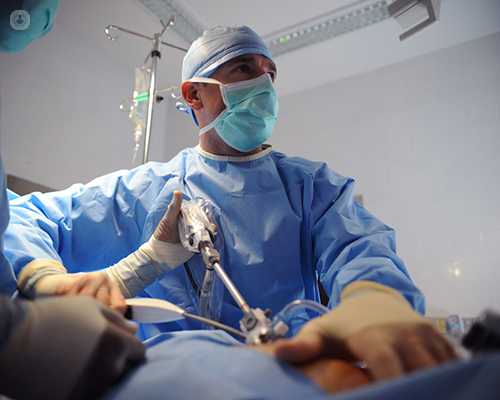Treating hernias laparoscopically
Written by:Mr Michael Stellakis is a leading laparoscopic abdominal surgeon with particular expertise in treating hernias. There are different types of hernia, including inguinal or femoral hernias (in the groin), para-umbilical (around the bellybutton) and incisional hernias (through old surgical scars). Hernias can cause pain, discomfort and can sometimes be debilitating. Rarely, they can be serious enough to be life-threatening.
What are the options for treating a hernia?
The only real option today is, unfortunately, surgery. The real question is when do you operate and that is an interesting question. Most would agree that if a hernia, wherever it is, if it is very big or painful, or is getting in the way of work or daily activities, then it should be repaired. The smaller, less symptomatic and less painful hernias are not always treated surgically, however, there is a consensus that believes they should be. This is because even in these small hernias, particularly the inguinal hernias, if you don’t repair them, with time they tend to get bigger, and the bigger they get, the more complex they are to repair. Additionally, the likelihood of something going wrong increases, such as the risk of strangulation where the contents of the hernia can lose their blood supply very suddenly, which in some cases can be extremely serious and even fatal if not acted upon immediately. Hence, even in small, asymptomatic hernias if the patient is young, fit and active they should be repaired surgically.
How can laparoscopic surgery be used in hernias?
Laparoscopic, or to give it another term, keyhole surgery which tends to use a few small incisions can be used very effectively in repairing certain hernias. Open surgery, on the other hand, involves making a single, larger cut in the groin. Certain hernias lend themselves particularly well to keyhole treatment, including groin, inguinal and femoral hernias. Incisional hernias have to be treated on a more bespoke basis, some are suitable for keyhole surgery but some, especially the larger ones, probably are not. Bellybutton or para-umbilical hernias, because they are small, are probably not best treated by keyhole surgery as the advantages are not that great.
What are the recovery times for laparoscopic hernia surgery?
Laparoscopic surgery particularly lends itself to groin hernia repair and in my practice, I do 90% of groin hernia repairs using the keyhole method.
The keyhole method has a number of very significant advantages:
- Less pain for a shorter duration (usually you are pain-free by the end of the first week)
- Quicker recovery time (Patients can be back to normal activities within 1-2 weeks. With open surgery, this can be double or triple the time.)
- With groin keyhole surgery we can routinely look at the other, unaffected side of the groin, which is not possible with open surgery. In about 10% of people we recognise that they will develop a hernia on the other side and, by checking it during laparoscopic surgery we can do something about it. This makes no difference to the patient’s recovery.
- The final advantage is that after groin hernia surgery, one of the complications is long-term chronic groin pain, which is not always debilitating, but it certainly can be a nuisance and people do complain about it. We quote for open surgery, about a 4-10% risk of this, but with keyhole surgery this is less than 1%. I have performed over 1,500 keyhole groin hernia operations and have seen chronic groin pain in just three or four patients.
However, laparoscopic surgery is not always best used in groin hernia surgery, particularly for elderly or frail patients. The reason for this is because you need a general anaesthetic to successfully complete a laparoscopic operation, whereas with an open hernia repair you can safely do that under local anaesthetic. Therefore, if the patient is not fit for general anaesthetic then an open repair may be better for them.
If you are concerned you may have a hernia, make an appointment with an expert.



